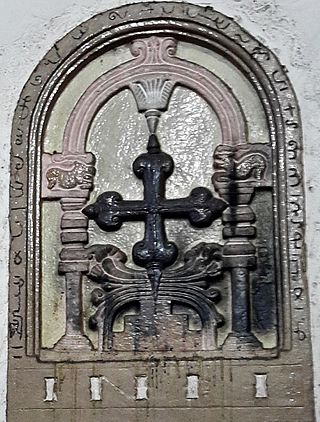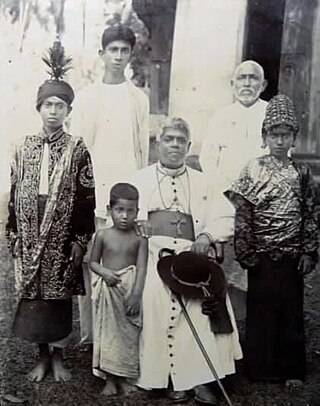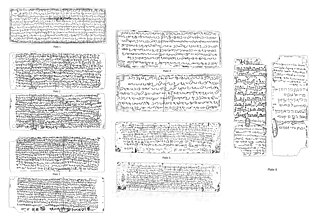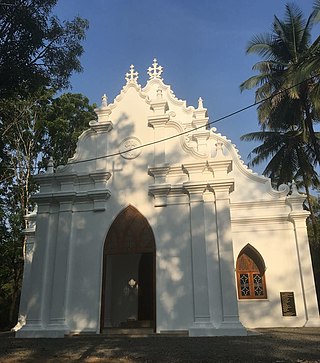Related Research Articles

The Saint Thomas Christians, also called Syrian Christians of India, Marthoma Suriyani Nasrani, Malankara Nasrani, or Nasrani Mappila, are an ethno-religious community of Indian Christians in the state of Kerala, who, for the most part, employ the Eastern and Western liturgical rites of Syriac Christianity. They trace their origins to the evangelistic activity of Thomas the Apostle in the 1st century. The Saint Thomas Christians had been historically a part of the hierarchy of the Church of the East but are now divided into several different Eastern Catholic, Oriental Orthodox, Protestant, and independent bodies, each with their own liturgies and traditions. They are Malayalis and speak Malayalam. Nasrani or Nazarene is a Syriac term for Christians, who were among the first converts to Christianity in the Near East.

The Syro-Malabar Catholic Church is an Eastern Catholic church based in Kerala, India. The Syro-Malabar Church is an autonomous particular church in full communion with the pope and the worldwide Catholic Church, including the Latin Church and the 22 other Eastern Catholic churches, with self-governance under the Code of Canons of the Eastern Churches (CCEO). The Church is headed by the Major Archbishop of the Syro-Malabar, currently George Alencherry. The Syro-Malabar Synod of Bishops canonically convoked and presided over by the Major Archbishop constitutes the supreme authority of the Church. The Major Archiepiscopal Curia of the Church is based in Kakkanad, Kochi. Syro-Malabar is a prefix reflecting the church's use of the East Syriac Rite liturgy and origins in Malabar. The name has been in usage in official Vatican documents since the nineteenth century.

The Malankara Mar Thoma Syrian Church, often shortened to Mar Thoma Church, and known also as the Reformed Syrian Church and the Mar Thoma Syrian Church of Malabar, is an autonomous Reformed Oriental church based in Kerala, India. While continuing many of the Syriac high church practices, the church is reformed in its theology and doctrines. It employs a reformed variant of the West Syriac Rite Divine Liturgy of Saint James, translated to Malayalam.

The Knānāya, also known as the Southists or Tekkumbhagar, are an endogamous ethnic group found among the Saint Thomas Christian community of Kerala, India. They are differentiated from another part of the community, known in this context as the Northists (Vaddakkumbhagar). There are about 300,000 Knanaya in India and elsewhere.

Christianity is India's third-largest religion with about 26 million adherents, making up 2.3 percent of the population as of the 2011 census. The written records of the Saint Thomas Christians state that Christianity was introduced in the Indian subcontinent by Thomas the Apostle, who sailed to the Malabar region in the present-day Kerala state in 52 AD.

Kollam/Quilon Syrian copper plates, also known as Kollam Tarisappalli copper plates, or Kottayam inscription of Sthanu Ravi, or Tabula Quilonensis record a royal grant issued by the chieftain of Kollam to a Syrian Christian merchant magnate in Kerala. The royal charter is engraved in old Malayalam in Vattezhuthu on six copper plates. The document is the oldest available Chera Perumal inscription.

This article lists the various old and ancient churches that exist among the Saint Thomas Christians in Kerala.

Thomas of Cana was a Syrian Christian merchant magnate who arrived to the Chera Dynasties capitol city of Kodungallur between 345 C.E. and 811 C.E. Thoma brought with him Jewish-Christian families and clergymen from Persian Mesopotamia.

The Malankara Church, also known as Puthenkur and more popularly as Jacobite Syrians, is the historic unified body of West Syriac Saint Thomas Christian denominations which claim ultimate origins from the missions of Thomas the Apostle. This community, under the leadership of Thoma I, opposed the Padroado Jesuits as well as the Propaganda Carmelites of the Latin Church, following the historical Coonan Cross Oath of 1653. The Malankara Church's modern-day descendants include the Jacobite Syrian Christian Church, the Malankara Orthodox Syrian Church, the Malankara Marthoma Syrian Church, the Malabar Independent Syrian Church, the Syro-Malankara Catholic Church and the Saint Thomas Anglicans of the Church of South India.

Mar Sabor and Mar Proth, according to Syrian Malabar Christian tradition, were two Chaldean Assyrian bishops who landed in the port of Kollam by the help of a Nestorian merchant, Sabr Iso in 823 AD. The mission is said to have received permission from the then king of Kerala to build a church in Kollam.

Kerala has a reputation of being, communally, one of the most religiously diverse states in India. According to 2011 Census of India figures, 54.73% of Kerala's population are Hindus, 26.56% are Muslims, 18.38% are Christians, and the remaining 0.33% follow other religions or have no religion. Hindus represent the biggest religious group in all districts except Malappuram, where they are outnumbered by Muslims. Various tribal people in Kerala have retained the religious beliefs of their ancestors. In comparison with the rest of India, Kerala experiences relatively little sectarianism.

Palayur Mar Thoma Major Archiepiscopal Church, is located at Palayur, in Thrissur district in Kerala on the west coast of India. According to Saint Thomas Christian tradition, the Syrian church was established in 52 AD by St Thomas, one of the twelve apostles of Jesus Christ. Saint Thomas performed the first baptism in India here, therefore this church is called an Apostolic Church credited to the apostolate of St. Thomas, who preached and also introduced Christianity to the people here. It is part of the Ēḻarappaḷḷikaḷ that he established in India, the others being at Cranganore, Kokkamangalam, Kottakkavu, Kollam, Niranam, and Chayal (Nilackal). The original small church structure has been retained at the original site. But substantial improvements around it were carried out during the 17th century by Giacomo Fenicio as necessary, without sacrificing the main sanctity of the place.
The Pakalomattam family is an ancient Marthoma Nasrani family in Kerala, India. According to the Royal Asiatic Society of Great Britain and Ireland, the family "solely supplied bishops and archdeacons to the Church [in India] till the beginning of the nineteenth century." The position of Archdeacon of All India, who oversaw the whole Christian church in India, was with very few exceptions filled by a member of the Pakalomattan family for generations.

The Saint Thomas Christian denominations are Christian denominations from Kerala, India, which traditionally trace their ultimate origins to the evangelistic activity of Thomas the Apostle in the 1st century. They are also known as "Nasranis" as well. The Syriac term "Nasrani" is still used by St. Thomas Christians in Kerala.

Nilakkal St. Thomas Ecumenical Church is one of the earliest Christian church in Kerala, India. This church is one among the Ezharappallikal believed to be established in 54 AD by St. Thomas, one of the twelve apostles of Jesus Christ.
Ezharappallikal, meaning seven and a royal church, are the seven major churches or Christian communities of Saint Thomas Christians across Malabar Coast of India that are believed to have been founded by Thomas the Apostle in the first century. According to Indian Christian traditions, the Apostle Thomas arrived in Muziris (Kodungallur) in AD 52, established the Ezharappallikal and evangelised in present-day Kerala and Tamil Nadu. Many of these churches built near Jewish and Brahmin settlements. These were at Maliankara (Kodungallur), Kollam, Palayoor, Kottakkayal, Kokkamangalam, Niranam and Nilackal (Chayal). Thiruvithamcode church in Kanyakumari was built on the land given by arachan (king) and hence it is often referred in the name Arappally. Similarly, the Churches at Malayattoor and Aruvithura are also referred to as Arappallikal.
Thazhekkod may refer to several places in Kerala, India:
St. Joseph Church, Aloor is a parish of the Syro-Malabar Catholic Church in Aloor. It was the first parish church in Aloor Muri of the Mukundapuram and Kodassery taluks. Aloor parish is one of the 83 parishes between the Bharathappuzha and Periyar rivers, during the erection of syro-Malabar hierarchy and Trichur Vicariate.

The Thomas of Cana copper plates, or Knanaya copper plates, dated variously between 345 C.E. and 811 C.E., are a lost set of copper-plate grants issued by the unidentified Chera/Perumal king of Kerala "Co-qua-rangon" to Syriac Christian merchants led by Knai Thoma in the city of "Makotayar Pattinam", south India. The royal charters were reportedly engraved in ”Malabar”, Chaldean and Arabic on both sides of two copper plates. Archbishop Francis Ros notes in his 1604 account M.S. ADD 9853 that the plates were taken to Portugal by the Franciscan Order.

The Kadavumbhagham Ernakulam Synagogue is the restored oldest synagogue of the Malabar Jews, with a Sefer Torah scroll and offering occasional services. It was established in 1200 CE and restored several times through the centuries on the same site. It is modeled on the earliest synagogue of the Malabar Jews at Muziris from the ancient times of Mediterranean sea trade with Kerala. The earliest synagogue of the ancient Malabar Jews is today submerged in the sea following the gradual rise of sea level over several millennia. Although the Chendamangalam Synagogue is the oldest surviving synagogue structure in Kerala and Indian subcontinent, its Torah scrolls were taken to Israel by it congregation in 1952. This makes the Kadavumbhagham Ernakulam synagogue the oldest Malabar Jewish synagogue today with a Torah scroll that is occasionally used for services. The Paradesi Sephardic synagogue at Mattancherry also has Torah scrolls but it was established much later in 1568.
References
- ↑ Thazhekad is the Anglicized form of the Malayalam name "Talekkad"; see T. K. Joseph, "Malabar Miscellany", parts V & 6, in Indian Antiquary, February 1928, pp. 24-31.
- ↑ Ibid. Joseph also provides a transcription and translation of the edict.
- ↑ Ibid., p.30.
- ↑ "The Edicts, Copper Plates and Privileges- Quilon (Tarisapalli) plates, Thazhekad edict, Iravi Kortan plate and Cana Thomman plate". NSC Network. 12 October 2014. Retrieved 25 August 2019.